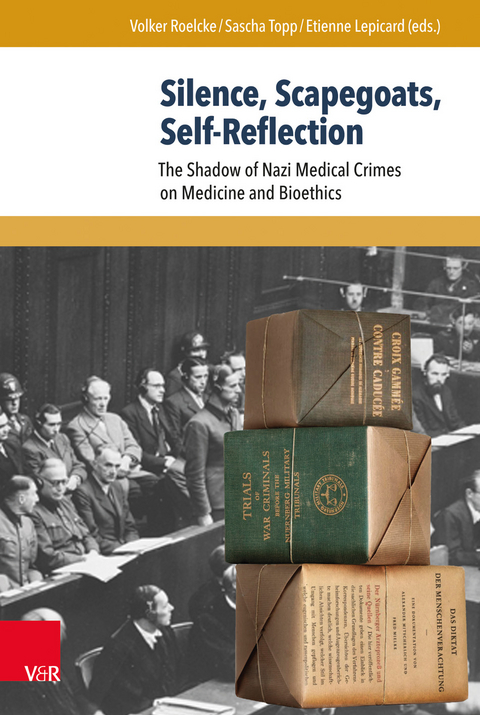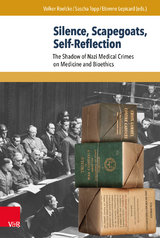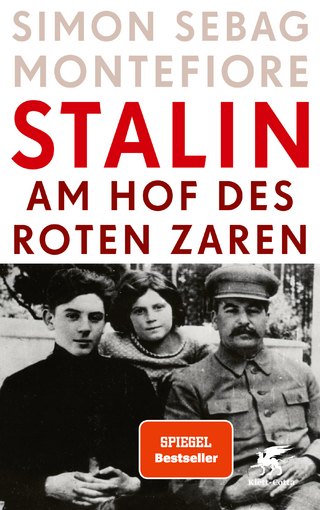Silence, Scapegoats, Self-Reflection
The Shadow of Nazi Medical Crimes on Medicine and Bioethics
Seiten
Interpretations of Nazi euthanasia crimes, their historicity in post-war medicine, as well as in the international discourse on biomedical ethics.
Since the end of World War II, Nazi medical atrocities have been a topic of ambivalent reactions and debates, both in Germany and internationally: An early period of silence was followed by attempts of victims and representatives of medical organisations to describe what happened. Varying narratives developed, some of which had a stabilizing function for the identity of the profession, whereas others had a critical and de-stabilizing function. In today's international debates in the field of medical ethics, there are frequent references to Nazi medical atrocities, in particular in the context of discussions about research on human subjects, and on euthanasia. The volume analyses the narratives on Nazi medical atrocities, their historicity in different stages of post-war medicine, as well as in the international discourse on biomedical ethics.
Since the end of World War II, Nazi medical atrocities have been a topic of ambivalent reactions and debates, both in Germany and internationally: An early period of silence was followed by attempts of victims and representatives of medical organisations to describe what happened. Varying narratives developed, some of which had a stabilizing function for the identity of the profession, whereas others had a critical and de-stabilizing function. In today's international debates in the field of medical ethics, there are frequent references to Nazi medical atrocities, in particular in the context of discussions about research on human subjects, and on euthanasia. The volume analyses the narratives on Nazi medical atrocities, their historicity in different stages of post-war medicine, as well as in the international discourse on biomedical ethics.
Prof. Dr. Paul Weindling lehrt am Institut für Geschichte, Philosophie und Religion der Oxford Brookes University, Großbritannien.
Prof. Dr. Volker Roelcke leitet das Institut für Geschichte der Medizin an der Universität Gießen.
Dr. Sascha Topp untersucht in einem Forschungsprojekt die historische Entwicklung der Verhaltens-, Neuro- und Kognitionswissenschaften im Rahmen der Max-Planck-Gesellschaft.
Dr. Etienne Lepicard lehrt am Ashkelon Academic College. Er ist außerdem Mitglied des israelischen Rats für Bioethik.
With a foreword by Jürgen Reulecke
With a foreword by Jürgen Reulecke
| Erscheint lt. Verlag | 28.1.2015 |
|---|---|
| Reihe/Serie | Formen der Erinnerung ; Band 059 |
| Co-Autor | Isabelle von Bueltzingsloewen, Donna Evleth, Margret Hamm, Gerrit Hohendorf, James Kennedy, Michael Seidel, William Seidelman, Hans-Michael Straßburg, Rolf Surmann, Paul Weindling, Annette Weinke, Michael Wunder, Fred Zepp, Helmut Bader, Rakefet Zalashik |
| Zusatzinfo | with 8 figures |
| Verlagsort | Göttingen |
| Sprache | englisch |
| Maße | 160 x 237 mm |
| Gewicht | 685 g |
| Themenwelt | Geisteswissenschaften ► Geschichte ► Allgemeines / Lexika |
| Geisteswissenschaften ► Geschichte ► Allgemeine Geschichte | |
| Schlagworte | Cultures of Memory • Erinnerung (Geschichte) • Erinnerungskulturen • euthanasia • Euthanasie • Euthanasie (Nationalsozialismus) • history of medicine • human experimentation • Human Rights • Medical Ethics • Medicine • Medizin • Medizinethik • Medizingeschichte • Medizin im Dritten Reich • Menschenrechte • Menschenversuche • National Socialism • Nationalsozialismus • Nürnberger Ärzteprozess • Pädiatrie • peadiatrics • Psychiatrie • Psychiatry |
| ISBN-10 | 3-8471-0365-2 / 3847103652 |
| ISBN-13 | 978-3-8471-0365-3 / 9783847103653 |
| Zustand | Neuware |
| Informationen gemäß Produktsicherheitsverordnung (GPSR) | |
| Haben Sie eine Frage zum Produkt? |
Mehr entdecken
aus dem Bereich
aus dem Bereich




